Trinity College Dublin
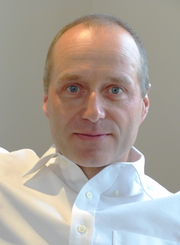
Balz Kamber
School of Natural Sciences
College of the Holy and Undivided Trinity of Queen Elizabeth near Dublin
College Green
Dublin 2
Ireland
Email: kamberbs(at)tcd.ie
Phone: +353 1 896 2957
Personal homepage
Balz Kamber is Chair and Professor of Geology and Mineralogy in the School of Natural Sciences at Trinity College Dublin. His research concerns itself with the large-scale elemental cycles on Earth, particularly the interaction between the solid Earth, the hydrosphere, the atmosphere and the biosphere on billion year time scales. He received his undergraduate and postgraduate degrees at the University of Bern, Switzerland, worked as a postdoctoral researcher at the Universities of Cambridge and Oxford, England, followed by seven years as a research fellow at the University of Queensland, Brisbane. He was then appointed as Tier 1 Canada Research Chair at Laurentian University, Ontario, before joining Trinity College Dublin in 2011. He is leading a research group of 2 advanced researchers/postdocs and 7 postgraduate students.
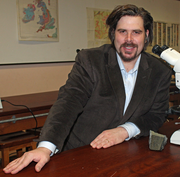
Seán McClenaghan
Department of Geology
Trinity College Dublin
Dublin 2
Ireland
Email: mcclens(at)tcd.ie
Phone: +353 1 896 1585
Personal homepage
Seán H. McClenaghan is Assistant Professor in Economic Geology in the Department of Geology, Trinity College Dublin, Ireland. Seán has been an active researcher in mineral deposits geology for 15 years, with a wide range of professional experience in governments, academia and the exploration industry. He is an expert on the trace-element geochemistry of hydrothermal systems, in particular Pb-Zn massive sulfide deposits, using state of the art analytical techniques (e.g., Secondary Ion Mass Spectrometry, Laser-Ablation ICP-MS) for dissecting ore-forming systems. Seán obtained a B.Sc. in Geochemistry at the University of New Brunswick, Fredericton, his M.Sc. in Geology at the University of Ottawa and his Ph.D. again at the University of New Brunswick. He has worked for exploration companies and for several Provinical Geological Surveys before joining Trinity College Dublin, where he is building an exploration geochemistry research group.
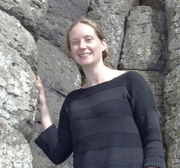
Emma Tomlinson
Department of Geology
Trinity College Dublin
Dublin 2
Ireland
Phone: +353 1 896 3856
Email: tomlinse(at)tcd.ie
Personal homepage
Emma Tomlinson is Assistant Professor of Igneous Petrology in the Geology Department at Trinity College Dublin (TCD). Her research involves applying trace element and isotope geochemistry to a multitude of topical problems in the geosciences. Emma graduated from the University of Bristol and completed her PhD at University College London, before spending six years at Royal Holloway University of London, first as manager of the NERC ICP lab and later on a NERC-funded tephrochronology project. Now at TCD, part of her work focuses on the use of tephra, both for dating and synchronising environmental records and for reconstructing the evolution of magmatic systems.
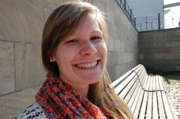
Ann-Kristin Kalveram (ESR)
Department of Geology
Trinity College Dublin
College Green
Dublin 2
Phone:
Email:kalvera(at)tcd.ie
Personal homepage
Ann-Kristin Kalveram is an Early Researcher (ESR) based in Trinity College Dublin, Ireland. Her PhD research involves working on trace elements and stable isotope geochemistry to develop a mineral exploration criterion. Her research is divided into two major parts: (I) the characterisation of the sub-economic Zn-Pb deposit Ballinalack, in the Irish Midlands. To this end, trace-element laser ablation ICP-MS work supplements petrographic observations of the sulphide minerals sphalerite and pyrite; (II) investigation of the overlying soil BC and Top of the till horizons for fingerprints indicating the underlying sulphide mineralisation by using trace elements, as well as Cu and Zn isotopes.
Ann-Kristin is from Germany, where she completed her undergraduate and early postgraduate studies. After her bachelor studies in Geosciences at the Ruhr Universität Bochum, Germany, she moved to the TU Bergakademie Freiberg, Germany, to pursue her master’s degree. While there, she specialised in economic geology and focused on the links between deposits and geochemistry. Ann-Kristin likes to think out of the box, therefore she is highly motivated to work in this interdisciplinary research group IsoNose.
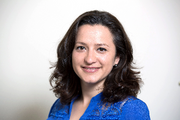
Carolina Rosca (ESR)
Department of Geology
Trinity College Dublin
College Green
Dublin 2
Phone: +353 83830940
Email: roscaca(at)tcd.ie
Personal homepage
Carolina is an Early Stage Researcher (ESR) at Trinity College Dublin, Ireland. She graduated from the University of Bonn in Germany, where she used trace element geochemistry and radiogenic isotopes (Sr-Nd-Hf-Pb) as tracers for mantle processes. Her scientific interests comprise the formation and interaction of the major terrestrial reservoirs: atmosphere-crust-mantle and their specific geochemical signatures. At Trinity College, Carolina’s PhD research focuses on the historical reconstruction and source characterization of atmospheric metal deposition onto the Irish peatlands. She explores the validity of using ultra-trace elements and stabile isotopes such as Zn to fingerprint anthropogenic events at local and hemispheric level. Additionally, she deploys trace element, S, and Pb isotopes to investigate volcanic aerosols following historic eruptions recorded within ombrotrophic peat. A better understanding of the events that have affected our atmosphere in the past is crucial in assessing the magnitude and impact of future hazards – this is why Carolina is enthusiastic about this project!

Nils Suhr (ESR)
Department of Geology
Trinity College Dublin
College Green Dublin 2
Phone: +57 321 3444875
Email: nsuhr(at)tcd.ie
Personal homepage
Nils is an Early Stage Researcher (ESR) at Trinity College Dublin, Ireland. He graduated at the University of Mainz in Germany, where he combined petrographic-, petrologic-, as well as structural observations with zircon (U-Pb) and garnet (Lu-Hf/Sm-Nd) geochronology, to reveal the history of Archaean granulite-facies paragneisses from central Swaziland. These rocks are among the oldest preserved continent-derived sediments on Earth (http://jgs.geoscienceworld.org/content/early/2014/10/27/jgs2014-007.abstract). Until the end of 2014, Nils will continue working for the Geological Survey of Ecuador and the Escuela Politécnica del Ejército (ESPE) in Quito, where he conducts his own research project about the El Oro Complex in SW Ecuador. At Trinity College, Nils will seek to understand the reasons for Zn and other vital metal deficiency in diet, resulting malnutrition and increased child mortality. Therefore, his PhD research will focus in understanding the origin of deficiency in soil and crops grown on metal deficient soils. He will measure full vital metal concentrations and Zn-isotope compositions in soil samples, to distinguish between inherent low Zn content of soil and Zn depletion through soil over-use. In addition, Nils’ research involves the testing of Zn-fertilisation and other potential remedial efforts to recover Zn-depleted soil profiles and crop samples in affected areas. Nils thinks it will be a great opportunity to work in international teams that have a broad expertise; therefore he is looking forward to working in the IsoNose team.


